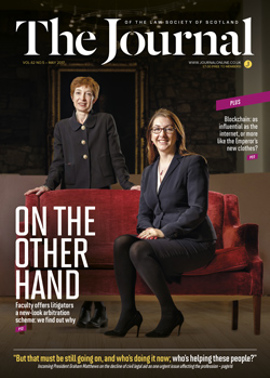Child abduction: two aspects

There have been two interesting cases involving child abduction published recently. One is English, but highly relevant for Scottish family lawyers. The other is a decision of Lady Wise in the Court of Session under the Child Abduction Convention.
Re X (a child) [2017] EWHC 158 (FAM)
The mother had taken the son from Scotland to England without the father’s prior knowledge or consent.
Following a hearing at the Court of Session, Lord Brailsford granted an order interdicting the mother from removing or attempting to remove the child outwith the UK, an order allowing messengers-at-arms to recover the child’s passport and an order prohibiting the mother or anyone on her behalf applying for replacement passports for the child.
The father was faced with the practical dilemma of how to recover the child’s passport. The Scottish order was enforceable north of the border only. The father’s only option was to go to the High Court in England to seek an order allowing Tipstaff to recover the passport, and a disclosure of information order. There was a without notice hearing at the High Court and the matter was referred to Sir James Munby, President of the Family Division.
The President granted a without notice location order, which allowed Tipstaff to recover the passports of mother and child. He commented on the unusual situation and noted that having crossed the border, it seemed the mother had put herself outside the reach of the messengers-at-arms and it was appropriate to grant orders to give effect to the relief previously granted by the Scottish court. He considered that, in accordance with Re A (A child) [2016] EWCA Civ 572, it was proper to grant a without notice location order as there was a very real prospect that the mother “would re-abduct the child, either taking the child abroad or moving to some other place either in this country or some other part of the United Kingdom” if notice of the application was given to her. The President’s judgment made it clear that he sought only to assist the Scottish courts, rather than give judgment on the merits or substance of the case.
Petition of GCMR [2017] CSOH 66
A child was wrongfully removed from Portugal by the mother in December 2011. The father sought her return under the Hague Convention. When proceedings started, the child was 10 years old and five years had passed since the abduction. The mother argued that the child had settled in Scotland, was expressing a strong wish not to return to Portugal, and finally, that she was at grave risk of harm if an order for her return were made.
Lady Wise noted that the child had now spent as much of her life in Scotland as in Portugal. There was a considerable volume of material evidencing accommodation, schooling, friends and hobbies. She found the child settled in Scotland.
She noted that there were directly contradictory accounts in the various affidavits, in particular the respondent’s allegation that the petitioner was violent. She referred to the Inner House case of D v D 2002 SC 33, which held that no conclusions could be drawn on the veracity of allegations in contradictory accounts in affidavits. There had to be clear and compelling evidence of a grave risk of substantial harm to the child if return was to be refused.
A child psychologist reported that the child strongly objected to the return. Lady Wise accepted that her objection was undoubtedly the product, in no small part, of the negative influence of the mother. However, she concluded that the child’s views, given her age and maturity, should be taken account of.
In exercising her discretion, Lady Wise noted that the objectives of the Convention should be considered along with, but not take precedence over, all other relevant factors. Despite noting that the case was in some ways a paradigm of the type of abduction the Convention was designed to address, Lady Wise refused the return. She concluded that the child’s strongly held views, coupled with the length of time that the child had been settled in Scotland, led to those interests prevailing when balanced against the primary purpose of the Convention.
The risk of such cases is that they may encourage further incidents of international child abduction, especially if abducting parents feel able to avail themselves of the protection of the passage of time.
In this issue
- “Without prejudice” save as to costs?
- Sanction for counsel: the new landscape
- Keeping payment practice up to scratch
- Access and the call of nature
- Why punish?
- Caught in the past
- Reading for pleasure
- Opinion: Louise Johnson
- Book reviews
- Profile
- President's column
- PAS proves a hit
- People on the move
- Beating the system?
- People perspective
- Leaving the EU: the legislative future
- Ledger for the digital age
- Charities - navigating a new landscape
- Do you know how much is enough to retire?
- Don't call it just a job
- Sanction: appeals not encouraged
- Child abduction: two aspects
- Challenges of gender identity
- Prior warnings and reasonable belief
- Powers in the past
- Scottish Solicitors' Discipline Tribunal
- Missives: can we conclude more quickly?
- Life beyond in-house
- Law reform roundup
- Career planning for women: a new conference
- AML: regulations bring new focus
- Fraud and cybersecurity: are you on the ball?
- Ask Ash
- Incidental financial business licence: the widening scope
- Love me, love me not?
- Appreciation: Kirk Murdoch
- Expert Witness Index 2017
- All in together






